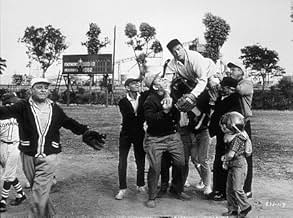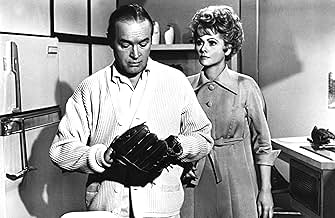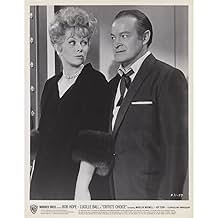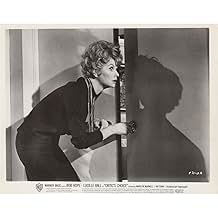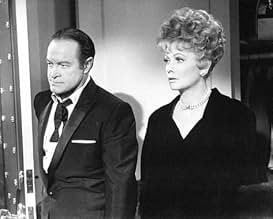Añade un argumento en tu idiomaParker Ballantine is a New York theater critic and his wife writes a play that may or may not be very good. Now Parker must either get out of reviewing the play or cause the breakup of his m... Leer todoParker Ballantine is a New York theater critic and his wife writes a play that may or may not be very good. Now Parker must either get out of reviewing the play or cause the breakup of his marriage.Parker Ballantine is a New York theater critic and his wife writes a play that may or may not be very good. Now Parker must either get out of reviewing the play or cause the breakup of his marriage.
- John Ballantine
- (as Ricky Kelman)
- Philip 'Phil' Yardley
- (as Evan McCord)
Reseñas destacadas
If I were to rate this as a comedy, I'd probably say that it fell flat - but I was actually quite taken with the story and the character of Parker. He was an unpleasant character. Yes, Hope played him with some comedy - but he wasn't a nice man. Once Angie decided to write her play (very early in the movie) Parker wouldn't let his critic's voice go. He discouraged her, he belittled her, he made fun of her - and most of it, while couched as a comedy, was actually rather mean and not funny. When the movie opened, Parker was writing a scathing review of a play that starred his ex-wife (who was played by Marilyn Maxwell.) That goes almost immediately into his acerbic attitude toward Angie's play. The point gets made in the movie that maybe Parker has a problem - he disses everything that the women who are close to him try to do, almost as if he's trying to sabotage them and their careers; as if he doesn't want a "successful" woman in his life. And, although there's an attempt to redeem him slightly at the end, Parker's most obnoxious scenes come late in the movie at the theatre, the night Angie's play opens in New York. Having withdrawn from reviewing the play, he shows up anyway - drunk and, frankly, obnoxious (I'm not sure why he wouldn't have been kicked out of the theatre, or even why he was allowed in in the first place) - tries to kick his paper's reviewer out and when he can't do that goes up to the balcony and causes quite a scene (this is where Hope's physical comedy comes in.) He then proceeds to write a review of the play anyway and his review is blistering, as he writes that the play "was written by Angela Ballantine, directed by Dion Kapakos, and produced by mistake." (I must admit that I wondered why his paper would allow a drunken reviewer - even a big name one - to write a review of a play written by his own wife to which someone else had been assigned as the reviewer, but maybe that's thinking too much about this.)
This was not what I was expecting. I was expecting a light comedy - instead I got more of a drama about a couple with some really serious issues in their marriage. And while I wouldn't rate it that highly as a comedy, I thought that if you look at it as a marital drama it's actually pretty good. For me, the most powerful scene in the movie didn't even involve Ball - it was the very dramatic and even acerbic confrontation between Parker and his son John (played by Ricky Kelman) - who seems to have irritated a few reviewers, but who I thought was actually pretty good, playing a kid who had obviously been raised in a somewhat strange environment. The scene was set at home on opening night, before Parker's drinking binge. That confrontation aside, John's relationship with his mother (Maxwell) was especially weird - she seems to have been largely uninterested in him, and he calls her not "Mom" but "Ivy."
There's a decent supporting cast - most of whose names (Rip Torn, Jim Backus, Richard Deacon and even Soupy Sales) add to the expectation that you're going to be watching a funny movie. But I would suggest not watching this to get a good laugh, even if that is your initial expectation. Watch it as more of a character study of Parker. It works much better that way. (7/10)
It's interesting that his second wife is more age appropriate than the first wife. I would expect it to be the opposite. A switch would make them fit the stereotypes, but it would also deprive the movie of the Hope Ball pairing. I'll take the pairing over the stereotyping. Their stardoms have faded from their pinnacles, but they still have plenty of star power. As a comedy, this is lacking especially considering the two legends involved. It's more a drama than a comedy. At least, it's better as a drama than a comedy. Bob Hope does his comedic mugging and it's not that funny. There is potential with the marital conflict. It works, but I would like more from Ball. This is very much his movie instead of their movie. This was sold as a comedy. It tries to be a comedy. They should have concentrated more on the drama.
RIP TORN is amusing as the director of Lucy's play, working on it night and day to put it into shape while Hope seethes with jealousy. Meanwhile, his ex-wife, MARILYN MAXWELL, is around often enough to keep Lucy irate enough.
The friction between theater critic and playwright comes to life whenever they trade barbs. The comedy aspects fall flat once in awhile with the more serious moments given more emphasis than usual in a Bob Hope/Lucille Ball comedy.
JESSIE ROYCE LANDIS does nicely as Hope's mother. This isn't the typical fare expected of Hope or Ball, but it has its moments where the plot elements have more dimension than usual in a caper of this sort.
Hope has his usual one-liners.
"What are you trying to do--drown your troubles?" a bartender asks him.
"No, I'm just teaching them how to swim."
On the other hand, there's little doubt about Bob Hope's aspirations. From his earliest days in vaudeville, Hope was a comedian, and he would always be a comedian. For all his kidding aside about earning as Oscar, Bob knew that he had little chance because Oscar very rarely went to a comedian. He even made his overt desire for an Oscar a part of his long- running comedy routines, and it was sure to get a laugh decade after decade
That doesn't mean that Bob Hope didn't do some very funny movies. But his type of humor wasn't the subtle, clever or zany type that usually involved great or very good acting. Clark Gable, James Stewart, Carole Lombard and Claudette Colbert were some of the very accomplished dramatic actors who could do Oscar-winning caliber comedy in movies. Bob's comedy forte was the one-liner. Or, make that, a string of one- liners, one after the other. And in that, he often aroused some great laughter.
So, that brings us to this movie, "Critic's Choice." This film is meant to be a semi-serious movie about Broadway and a critic's life, with a comedic outlook. And Lucy plays a serious character, a "straight man" to Bob's wisecracks and one-liners. I think it was intended as a light comedy to begin with, sans any zaniness on Lucy's part. The very funny parts are in the last half with Bob. He has some zany scenes himself, and a few strings of one-liners that bring out loud laughter. Some examples are: "This is the drunkenest room I've ever been in." "This apartment's all uphill." And, "I'd just like to be there when we get where I'm going."
"Critic's Choice" is a nice film for an evening of light entertainment, and worth watching just to see two of the great comics of all time together.
Stepping into the roles played on stage by Henry Fonda and Georgeann Johnson are Bob Hope and Lucille Ball in their fourth and last film together. The more traditional Hope and traditional Lucy are to be found in their earlier films Sorrowful Jones and Fancy Pants. Still Critic's Choice works a whole lot better for them than The Facts of Life.
Bob Hope is a theater critic and he's got a son by his first marriage to Marilyn Maxwell, Ricky Kelman. He's married now to Lucille Ball and Lucy's taken it in her head to write a play about her family life growing up with two sisters, Marie Windsor and Joan Shawlee, and her mother Jessie Royce-Landis. Hope fluffs the idea off, but this only makes Lucy more determined especially when she's working with director Rip Torn and producer John Dehner.
There are a ton of characters not in the original play which took place in the Hope/Ball apartment. The addition of a lot of these people allowed Hope and Lucy to engage in some of their traditional comedy which they didn't do in The Facts of Life and paid dearly for it.
This has to be the only film I know where the 'other' woman is the first wife. Marilyn Maxwell who it was reputed Hope was involved with around 1950 and who appeared in The Lemon Drop Kid with him, sees her chance back with him as Rip Torn starts to get interested in Lucy.
Bob and Lucy get good support from a well chosen cast of familiar faces and Critic's Choice should please their fans.
¿Sabías que...?
- CuriosidadesLast of four feature films that Bob Hope and Lucille Ball made together. The other three pictures were El rey del Oeste (1950), Sorrowful Jones (1949), and Los hechos de la vida (1960).
- PifiasThe movie takes place in New York, but during the softball game, the famed Los Angeles Gas Works tank is clearly visible in the background.
- Citas
John Ballantine: For the record, Sisters Three was written by Angela Ballantine, directed by Dion Kapakos, and produced by mistake.
- Créditos adicionalesEnding: "The absolute End"
- ConexionesReferenced in What's My Line?: Bob Hope and Lucille Ball (1963)
Selecciones populares
- How long is Critic's Choice?Con tecnología de Alexa
Detalles
- Fecha de lanzamiento
- País de origen
- Idioma
- Títulos en diferentes países
- Cuando el corazón manda
- Localizaciones del rodaje
- William Mead Homes, 1300 Cardinal Street, Los Ángeles, California, Estados Unidos(Apartments/baseball field)
- Empresa productora
- Ver más compañías en los créditos en IMDbPro
- Duración1 hora 40 minutos
- Relación de aspecto
- 2.35 : 1
Contribuir a esta página



